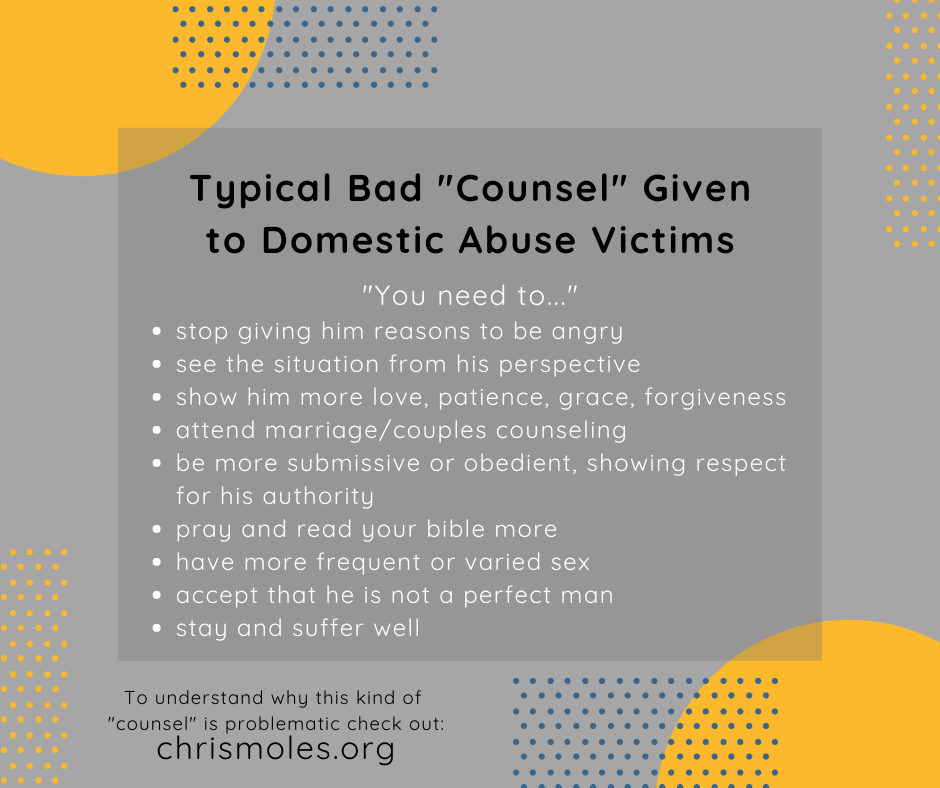As we wind up this month’s focus on Domestic Abuse Awareness, there is obviously far, far more to be said.
I’ve kept things pretty succinct this past month, out of necessity. The point was to bring awareness. To ignore this issue, to not offer support, to not bother to learn how to support victims/survivors, when this issue is so rampant only compounds the problem. Nearly 1/3 of all women have suffered domestic abuse–and sadly, for Christian women the statistics aren’t really any better. Sticking your head in the sand won’t make this problem go away.
The ramifications of Domestic Abuse don’t end when a woman gets out. For many, abuse continues through ongoing harassment by the abuser, court injustices, counter parenting, and more. In addition, 90% of domestic abuse survivors suffer longterm effects from the trauma they’ve been in–whether that was physical battery or covert destruction of her very personhood. C-PTSD, Complex PTSD is from trauma that was ongoing (not just a one time event.) For many of these women, even though the abuse has changed, and her life is far better, hopeful and happier, than while she was living daily in the abuse, abuse is still ongoing, in different ways.
Much love and support are needed by women, not only in domestic abuse, but by those who have gotten out of domestic abuse. Research shows that those that heal best and quickest, are those that have ongoing community support, family, friends, and church that listen to them, believe them, help and support them. Who are there for them, as they go through this hell on earth. Listening to and believing a victim/survivor is by far the best thing you can do.
Be there! Listen! Believe her! It’s really quite simple.
Be there! Go places with her. Do fun things with her–regularly. Go to coffee. Lunch. A show. Send her encouraging texts–often. Call her–often. Check on her. Don’t wait for her to contact you. (But also) Answer/respond to her calls/texts. Help her with home projects. Help her with her kids. Help her find the help she needs, making phone calls, appointments, etc. Do some research for these things for her.
Listen! She has a story–and it’s not a pretty one. But she needs to tell it. She needs to be heard. You don’t have to worry about not knowing what to say. She needs your ear more than your advice. There are times she will need to bounce big decisions that she’s facing off another person and get your perspective, but mostly she just needs you to care enough to let her tell her story (even if it’s more than once) and let her process it out loud. Please don’t tell her that you don’t know how to help her and that she just needs to call a therapist. She may indeed need (and probably has) a therapist/counselor. She needs a true, listening, caring, supportive friend much more!
Believe her! Please don’t bring false accusations against her. Don’t ask what she did to cause the abuse. Don’t tell her that you know the abuser, and he’s not like that at all, he’d never do such things. You were not there. She was. You don’t know what happened behind closed doors. She does.
Don’t! Don’t tell her that she needs to get her eyes off the abuse/abuser and onto her own sins. Don’t tell her she needs to submit more, keep a cleaner house, have awesome meals waiting for him, serve him more, give him more (or more exciting/kinky) sex. Don’t tell her she needs to suffer silently “for Jesus”. Don’t tell her she just needs to “have more faith” and “pray more”. Don’t tell her stories of a woman you know who stayed for 65 years with an abuser and he “got saved” a week before he died. Don’t EVER tell her she needs to go back to the abuser! Don’t ever tell her she’s going against God, or that God isn’t happy with her/doesn’t love her, if she leaves (has left) the abuser.
Just because Domestic Abuse Awareness month is over, please don’t stick your head back in the sand. The month wasn’t just to give a nod toward victims/survivors, it was to make their friends and family more aware of what has been going on, and what is needed from them. To provide the impetus to keep going. Continue to be aware. Grow in your involvement. Jesus came to heal the brokenhearted, to set the captive free, to bring liberty to the oppressed. Can you do any less, as His feet and hands, with His heart?
Perhaps you’ve noticed that Pray isn’t in my list above. It certainly isn’t because your friend/family member doesn’t need and crave your prayers. They do! But too often, that is all they get. “I’m praying for you,” with no practical help or friendship and care shown. Please do pray–often and fervently! But remember faith without works is dead.
As a reminder, here’s what NOT to say to an abuse survivor. Sadly, this bad advice is common. Avoid these. Have a listening ear. Be there. Be a true friend.

💝
Living Coram Deo & freely whole
SDG!
~ Liberty—Life Restoration & Soul Transforming Creativity Coach
Empowering you to live a life that is Freely Whole—spirit, soul, and body—in Jesus!
Connect with Freely Whole on Social Media
💝
Discover more from freely whole {living}
Subscribe to get the latest posts sent to your email.





